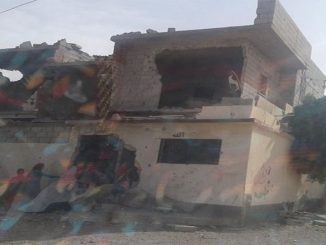
An American report has warned that Egypt would turn to another Iraq in the Middle East region.
The American Conservative website has published a report titled:”Egypt and the End of the Secular Middle East”. The report assured that Egypt’s latest terrorist attacks “could succeed in splitting Egyptian elites and causing significant defections.”
The report also predicted that,”In the worst-case scenario, such a process runs the risk of bringing Egypt to conditions that we more commonly associate with Iraq, which would pose catastrophic dangers.”
It said that Egypt would turn to another Iraq as a result of repression that accelerates the terrorist attacks in the country; and at that time, Egypt would be divided ideologically and politically, and by then,”When a state is destroyed, we have little idea what will grow from its ruins.”
“Iraq offers the best example of such a transformation. However bizarre this might appear, we can witness a direct transition from secular nationalism to the most extreme forms of religious extremism, including the Islamic State itself.”
According to the report, when ISIS terrorists tried to attack the ancient monastery of St. Catherine’s, in Egypt’s Sinai desert last month.
That fact might not sound too surprising, until we recall that St. Catherine’s has in its possession a decree of protection issued by the Prophet Muhammad himself and supposedly valid until the end of the world.
It also pointed that the recent attacks,”Most obviously, they demonstrate the Egyptian government’s weakness in the face of armed jihad, while helping to undermine the economy by deterring tourists. But there is a larger and more critical agenda.”
But the most important, “By giving the continuing crisis a distinctly religious coloring, the jihadis are trying to force Egyptian elites to choose between Islam (as they portray it) and its enemies. This strategy is dangerous because it plausibly could succeed in splitting Egyptian elites and causing significant defections. This in turn would accelerate a critical trend in the modern Middle East, namely the near-collapse of secular ideologies across the region and the consequent rise of hard-edged political Islamism.”
Toward more Religious rather than National Polarization
The writer tries to explain why Egypt is close to the Iraqi scenario by introducing the history of the Arab nationalism in Egypt, Iraq, and Syria with its different forms whether socialist or secularist and how Egypt’s Christians surrendered to the secular model as Abd al-Nasser’s regime and others which didn’t oppose repress them but in return he bitterly persecuted the Muslim Brotherhood, and in 1966 Egypt executed the movement’s leading intellectual, Sayyid Qutb.
He also pointed that the minorities in Egypt, Iraq and Syria were firm supporters to secular and nationalist movements, as they feared the overwhelming weight of political Islam.
However, these minorities were tainted by their association with unpopular dictatorships.
That was all the more dangerous when those minorities were the targets of long-standing ethnic or religious prejudices, pointing to the Coptic Christians’ association to al-Sisi regime nowadays.
With Al-Sisi: The Situation is more Dangerous
The report then pointed to al-Sisi regime and his relation with the Coptic minority saying,”the bloody military coup led by Gen. Abdel Fattah al-Sisi, in July 2013 has destroyed any hopes of a peaceful democratic road to Islamist political power.”
It also added that,”Egypt’s current Sisi government is trying to reproduce the old Nasser system, complete with personality cult, but this is now happening in a vastly different political context.”
“Far from being relatively passive, activist Muslims are now highly militant and organized, while the coup destroyed any hopes of a peaceful democratic road to Islamist political power. That left only the armed road to revolution.”
Religious Hatred
At that point, the report reach that Egypt would turn to another Iraq in the context of a religious and ideological conflict as it stated that,” Boosted by internet propaganda, ideas of popular armed jihad have become mainstream, resulting in surging guerrilla campaigns across the country, especially in the Sinai.”
“But interfaith relations have also been transformed, with much more intense and widespread popular hatred of Christians, “said the report.
Moreover, the report said,”In the new post-2013 environment, there are multiple reasons why Christians are such a natural target for Islamist terror.”
“Given the strength of the Egyptian military and its strong intelligence networks, it is natural for jihadis to choose soft targets—poorly defended places and institutions—where the goal is to kill the maximum number of civilians. Once upon a time, Western tourists would have been the obvious targets of choice, but such visitors are no longer much in evidence. By default, then, Coptic Christian churches and communities are attacked.”
In the end,”The anti-Christian terror serves to divide Egypt along religious and sectarian lines while offering the added bonus of infuriating the West. If attacks became sufficiently common, we might expect to see Upper Egypt sliding into overt sectarian conflict as Christian and Muslim militias battled.”
The Future Scenarios
The report stressed that the Egyptian case, though, the situation has changed so rapidly, and generally deteriorated, over the past few years that it is necessary to project present trends only a little into the future. Some hypothetical are all too probable.
First:
Egypt’s armed forces would become engaged in prolonged internal warfare like the horrors that overwhelmed Algeria in the 1990s. In this case, there are some challenges:
-How long would they be able to maintain the loyalty of their (conscripted) ordinary soldiers and junior officers? In particular, how long could the government count on the army and police to defend those hated Christians against good Muslims?
-If the armed forces split, that would simply open the way to revolution. Perhaps this would be an elite Colonels’ Coup, such as Nasser himself led in 1952, or else we might imagine something like the general defection of the armed forces to Islamist revolution as occurred in Iran in 1979.
Either way, we would be looking at a new military order, with a radical new sympathy for Islamist causes. The fate of Coptic Christians in such a new Egypt would be grim indeed.
Second:
Egypt resembles Iraq as it was also a secular nationalist as the case in Egypt but when the American invasion of 2003 and the civil war in Iraq, it turned to one of the most hardline forms of religious extremism; either as most of the surviving Ba’ath leadership had forged close ties with extreme Sunni Islamists and Salafists, and many studies have now demonstrated the clear Ba’athist roots of the ISIS movement that emerged after 2013, or as a result of Saddam Hussein explicit decision to adopt more Islam-friendly policies, which began a rapprochement with conservative Salafi Sunni believers.
That in turn laid the foundation for a revolutionary shift after 2003, with the growing resistance to Allied occupation.
In this context, if Egypt is controlled by a deep state since a long period of time. Is it vaguely conceivable that a secular- and nationalist-minded military/intelligence establishment make a near-overnight transition from persecuting Islamists to joining and leading them?
Stay with Dictators!!!
Despite these analysis and similar events, the report advice that these experiences offer many lessons for U.S. policymakers, most powerfully in how they select their regional priorities because “If the present regime did fail, that could have cataclysmic consequences. “It also adviced them to understand more “the role of religion in political life.”
Moreover, it stated that the “American leaders should recognize just how fragile the Sisi regime might be, in contrast with its recent predecessors. Having closed off alternative routes to change, any transition is likely to come from within the military or the intelligence world, and the U.S. should be prepared for sudden and perhaps lurching transformations.”
The report also highlighted that,”U.S. policymakers in particular must be very cautious in selecting the regimes they seek to weaken or even to displace.”
However, in the end the researcher present a weird suggestion; especially to U.S policy makers that deserting dictators would lead to worse results saying that as we saw all too well in Iran in 1979, and more recently in Libya and Iraq,” removing even loathsome dictators can mean that they are replaced by far worse alternatives, commonly rooted in extremist forms of religion.”



